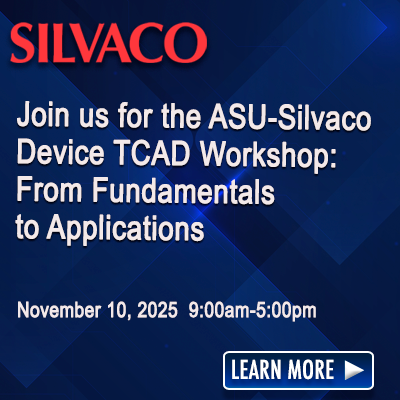The ASU-Silvaco Device Technology Computer-Aided Design Workshop is a pivotal educational and professional development event designed to bridge the gap between theoretical semiconductor physics and practical device engineering. Hosted by Arizona State University in collaboration with Silvaco, a leading provider of TCAD software, this workshop offers participants a comprehensive exploration of semiconductor device simulation, from foundational concepts to advanced applications. Spanning topics such as device physics, process simulation, and real-world design challenges, the workshop equips engineers, researchers, and students with the tools to innovate in the rapidly evolving field of microelectronics.
The workshop typically begins with an introduction to TCAD fundamentals, emphasizing the role of simulation in modern semiconductor design. Participants learn how TCAD tools model the electrical, thermal, and optical behavior of devices at the nanoscale. Silvaco’s suite of software, including Atlas, Victory Process, and DeckBuild, is introduced as a powerful platform for simulating semiconductor fabrication and performance. These tools allow users to predict device behavior under various conditions, optimize designs, and reduce the need for costly physical prototyping. The foundational sessions cover key concepts like carrier transport, quantum effects, and material properties, ensuring attendees grasp the physics underpinning TCAD simulations.
As the workshop progresses, it delves into practical applications, demonstrating how TCAD is used in industries such as integrated circuits, power electronics, and photovoltaics. Participants engage in hands-on sessions, guided by ASU faculty and Silvaco engineers, to simulate processes like doping, oxidation, and lithography. These exercises highlight how TCAD can optimize fabrication steps, improve yield, and enhance device reliability. For instance, attendees might simulate a MOSFET’s performance to analyze parameters like threshold voltage or leakage current, gaining insights into design trade-offs. The workshop also covers advanced topics, such as modeling FinFETs, tunnel FETs, or emerging 2D materials like graphene, reflecting the cutting-edge needs of the semiconductor industry.
A key strength of the ASU-Silvaco workshop is its emphasis on bridging academia and industry. ASU’s expertise in semiconductor research, combined with Silvaco’s industry-standard tools, creates a unique learning environment. Participants, ranging from graduate students to seasoned engineers, benefit from real-world case studies, such as optimizing power devices for electric vehicles or designing low-power chips for IoT applications. The collaborative setting fosters networking, enabling attendees to connect with peers and experts, potentially sparking future research or career opportunities.
By the workshop’s conclusion, participants gain a robust understanding of TCAD’s role in accelerating innovation. They leave equipped with practical skills to simulate and analyze semiconductor devices, as well as an appreciation for how these tools address challenges like scaling, power efficiency, and thermal management. The ASU-Silvaco Device TCAD Workshop stands out as a vital platform for advancing semiconductor expertise, empowering attendees to contribute to the next generation of electronic devices in a world increasingly driven by technology.
About Silvaco
Silvaco is a provider of TCAD, EDA software, and SIP solutions that enable semiconductor design and digital twin modeling through AI software and innovation. Silvaco’s solutions are used for semiconductor and photonics processes, devices, and systems development across display, power devices, automotive, memory, high performance compute, foundries, photonics, internet of things, and 5G/6G mobile markets for complex SoC design. Silvaco is headquartered in Santa Clara, California, and has a global presence with offices located in North America, Europe, Egypt, Brazil, China, Japan, Korea, Singapore, Vietnam, and Taiwan. Learn more at silvaco.com.
Also Read:
GaN Device Design and Optimization with TCAD
Simulating Gate-All-Around (GAA) Devices at the Atomic Level
Silvaco: Navigating Growth and Transitions in Semiconductor Design
Share this post via:

![SILVACO 051525 Webinar 400x400 v2[62]](https://semiwiki.com/wp-content/uploads/2025/04/SILVACO_051525_Webinar_400x400_v262.jpg)





Comments
There are no comments yet.
You must register or log in to view/post comments.